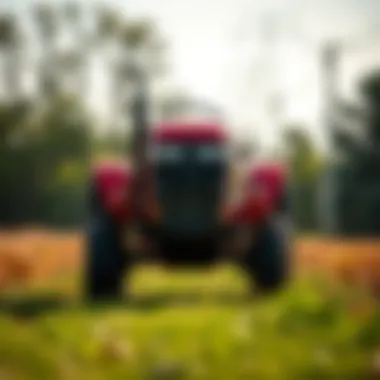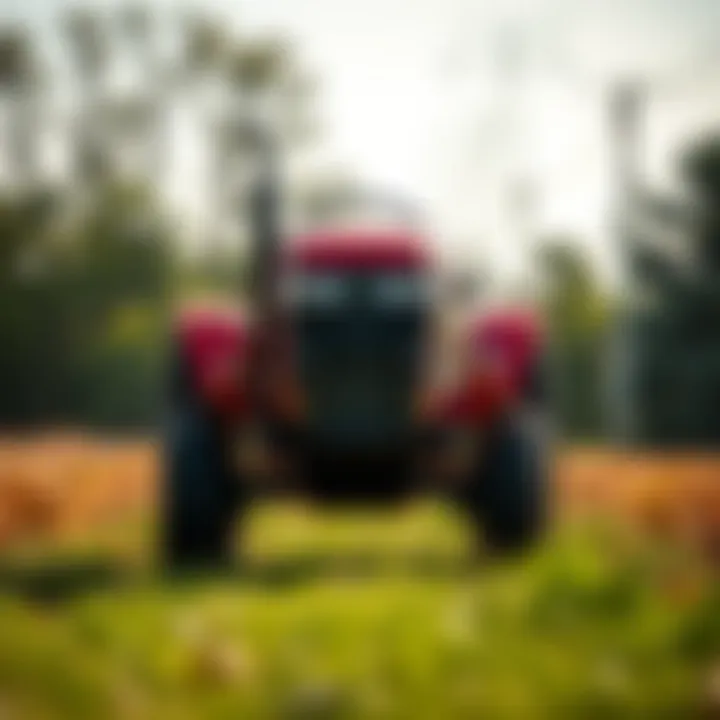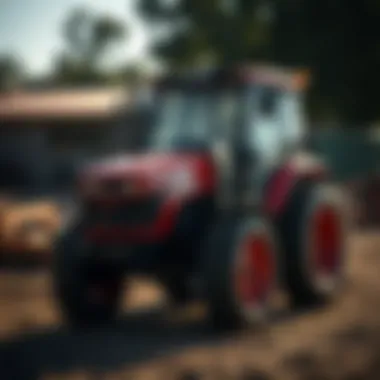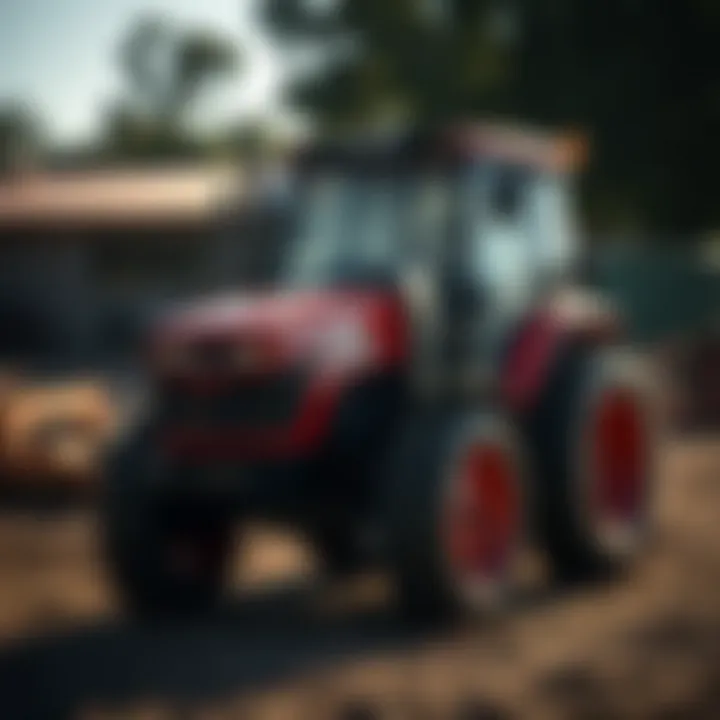Exploring Case Mini Tractors: A Comprehensive Guide


Intro
The ever-evolving landscape of agriculture necessitates adaptation and innovation, and Case mini tractors exemplify this need for modern farming solutions. These compact machines are more than just tools; they are pivotal in reshaping how farmers manage their lands and crops efficiently. As farming techniques become increasingly sophisticated, understanding the design and function of these tractors is paramount for anyone in the agricultural field. The intricate balance between performance and practicality is what makes a Case mini tractor stand out.
This article will unravel the myriad ways Case mini tractors enhance productivity in farming and horticulture. We will explore the essential features that define these compact machines, examine their applications across different agricultural settings, and provide insights into their advantages and limitations. From comparing Case tractors with other brands to delving into maintenance tips and evaluating their environmental impact, this guide will arm potential buyers and users alike with the knowledge they need to integrate mini tractors into their agricultural practices.
With an emphasis on practicality and grounded insights, we'll ensure that every detail serves the purpose of facilitating informed decisions. Let’s journey into the world of Case mini tractors and discover how they can benefit not just farmers but the broader landscape of agricultural possibility.
Research and Data Analysis
In a world where data drives decisions, understanding the latest trends in agriculture and horticulture is paramount. With sustainability and efficiency at the forefront of farming practices, Case mini tractors align perfectly with these priorities.
Latest Trends in Agriculture and Horticulture
The agricultural sector is witnessing a shift towards miniaturization of machinery. The focus is not only on scale but also on precision and sustainability. More farmers are adopting compact tractors like those from Case to ensure efficient land management without compromising on output. The cautious embrace of technology such as precision farming showcases the potential for Case mini tractors to thrive in this landscape.
- Eco-friendly Practices: Farmers are increasingly interested in machines that lessen their carbon footprint, broadening the appeal of Case mini tractors.
- Smart Technology Integration: Newer models are being designed with advanced systems for monitoring and controlling performance, thus optimizing both yield and efficiency.
- Customization Options: The demand for tractors that can be tailored to specific tasks, such as tilling or planting, has risen sharply.
Statistical Insights into Crop Yields
It's essential to scrutinize how the usage of mini tractors correlates with increased crop yields. Research indicates substantial improvements linked directly to the enhanced efficiency and maneuverability of Case mini tractors.
From smallholder farms to larger enterprises, data from agricultural studies suggest a potential yield increase of up to 20% when utilizing the right machinery for task-specific operations. It’s clear that a focused investment in technology, like that offered by Case, lays a concrete foundation for a fruitful harvest.
“In farming, the right tool can make a significant difference—mini tractors open new avenues for optimization.”
With these insights into the latest trends and statistical correlations, we build a framework for understanding how Case mini tractors contribute uniquely to modern agriculture. The ability to adapt and integrate these machines into existing practices represents a formidable advancement for farmers and horticulturists alike.
Preamble to Case Mini Tractors
The significance of mini tractors in the realm of agriculture cannot be overstated. These compact machines are tailored to meet the varied needs of today's farmers, especially in small to medium-sized operations. Case mini tractors stand out for their reliability and efficiency, offering distinct advantages in maneuverability, versatility, and cost-effectiveness. Farmers and horticulturists who opt for these machines find that they can enhance productivity while also addressing specific agricultural tasks with ease.
Agricultural practices are evolving rapidly, and the demand for equipment that is both robust yet manageable has led to a growing interest in mini tractors. Farmers often face challenges in navigating the tight spaces of orchards, vineyards, or urban farms. Here, Case mini tractors shine, as they are built with compact structures designed for tight navigation. By employing these tractors, users can maximize productivity without the downsides typically associated with larger machines.
Historical Background of Case Tractors
Case tractors have a rich heritage dating back to the late 19th century. Founded in 1842, Case was initially focused on portable steam engines and threshing machines, making waves in the agricultural machinery sector well before tractors became commonplace. As mechanization gained momentum in farming circles, Case integrated new technologies, leading to the production of some of the first gasoline-powered tractors in the early 20th century. This historical journey laid the groundwork for what would eventually become a well-respected brand in the mini tractor market.
Through decades of innovation and dedication, Case has built a reputation for durable and reliable tractors. The Case brand's roots run deep in agricultural communities, where their machines have powered countless farms. The introduction of mini tractors allowed for a new line of products that are more accessible to farmers needing efficient solutions without the size and weight of traditional tractors. This very evolution reflects not just a response to market needs but also a deep understanding of land and agricultural efficiencies.
The Evolution of Mini Tractors
The mini tractor segment has evolved significantly since its inception. Originally designed as a simple means to replace hand labor for small tasks, these tractors have undergone numerous enhancements over the years. Early models were basic, often lacking advanced features that enhance productivity. Now, modern mini tractors are equipped with powerful engines, sophisticated hydraulic systems, and a range of attachments capable of performing diverse tasks.
In the early stages, mini tractors primarily catered to small farmers. However, their appeal quickly spread as landscaping professionals, horticulturists, and those engaged in urban agriculture began to leverage their capabilities. The rise of sustainable farming practices has also influenced the design and function of mini tractors, leading manufacturers like Case to innovate and create machines that are not only efficient but also environmentally friendly.
Today's mini tractors are often outfitted with cutting-edge technology, including GPS capabilities and smart farming integrations, which point toward a future where automation and precision agriculture will play a central role. As the agricultural landscape continues to shift, mini tractors are positioned to remain a vital component in both traditional farming and emerging urban agricultural systems.
Design Features of Case Mini Tractors
The significance of design features in Case mini tractors cannot be overstated. These elements are what ultimately differentiate them from other machines and contribute to their efficacy on the field. They blend functionality with compactness, providing solutions that cater to the unique challenges faced by farmers and horticulturists alike. By understanding the design features, users can appreciate how these tractors enhance operational efficiency and productivity in various agricultural settings.
Compact Structure and Size
One of the standout features of Case mini tractors is their compact structure. Designed for maneuverability, these tractors easily navigate through tight spaces like narrow lanes and between rows of crops. This compactness isn’t just a matter of convenience; it plays a practical role in maximizing usability in confined areas, where larger tractors simply won’t fit.
Additionally, a smaller tractor allows for easier transport between fields. The lightweight structure reduces wear and tear on the tractor during transportation and minimizes the amount of fuel used. This aspect is particularly relevant for farmers looking to cut costs while boosting productivity.
"Being able to get into those tricky spots without tearing up the soil is a game-changer for many of us."
Engine Specifications
The heart of any tractor lies in its engine specifications, and Case mini tractors are no exception. They typically feature robust engines that deliver adequate horsepower for a variety of tasks without compromising efficiency. Most models utilize diesel engines which are known for their durability and fuel economy.
This brings important benefits to farmers or users who might be under pressure to deliver results in challenging conditions. A reliable engine means less downtime and more focus on productivity. Not to mention, Case tractors are often designed with minimal maintenance requirements in mind, translating to longer working hours without frequent interruptions.
Hydraulic System and Lift Capacity
Another critical aspect of Case mini tractors is their hydraulic system and lift capacity. The hydraulic system enhances the tractor's performance in handling various implements. With solid lift capacity, these machines can easily lift attachments ranging from plows to seeders with minimal strain.
This capability allows users to tackle diverse tasks on the farm, enhancing the utility of the tractor. Efficient hydraulic systems can also result in a smoother operation, allowing for precision work without the hassle of cumbersome lifting mechanisms. Having the right hydraulic system can make a world of difference during busy planting or harvesting seasons.
In summary, the design features of Case mini tractors—compact structure, powerful engine specifications, and efficient hydraulic systems—are meticulously crafted to meet the demands of modern agriculture. Farmers can depend on these elements to provide reliability and flexibility, making every field operation a bit easier.


For more detailed insights on tractors and farming practices, visit Wikipedia on tractors or Agricultural resources for an in-depth exploration.
Functional Capabilities
Understanding the functional capabilities of Case mini tractors is crucial for optimizing agricultural productivity. These machines are designed to perform a variety of tasks efficiently and effectively, making them indispensable for farmers and horticulturists. Their utility primarily lies in their adaptability—able to handle different attachments for various jobs, which further enhances their value in the field.
This section will explore how the versatile attachments and operational efficiency contribute to improved outcomes in agricultural tasks.
Versatile Attachments
Plows
Plows stand out as one of the core attachments available for Case mini tractors. Their primary role in soil preparation cannot be overlooked. A key characteristic of Case plows is their robust build, which ensures durability and consistent performance. The ability of these plows to cut through tough soil conditions makes them a favorite among users looking to cultivate their fields effectively.
One unique feature of the Case plow is its adjustable depth settings. This capability allows farmers to tailor the plow’s operation to varying soil types and conditions. Such flexibility enables farmers to optimize their tillage practices, resulting in better soil health and crop yields. However, the downside can be the time and skill required for proper setup and operation, which can deter novice users.
Brush Mowers
Brush mowers are another essential attachment for Case mini tractors, adept at tackling thick grasses and brush, which is particularly useful for maintaining pathways or clearing land for agricultural use. The key characteristic of these mowers is their powerful cutting ability, often employing a series of blades that can handle tricky terrains with ease. This makes them a go-to choice for those needing to manage overgrown areas efficiently.
A defining feature of brush mowers is their ability to be easily switched out. This means a farmer can go from mowing to plowing without needing special tools, thus saving time. Nevertheless, they do require a bit more horsepower to operate effectively, which can limit their use on smaller mini tractors.
Tillers
Tillers are perhaps the epitome of versatility among the attachments available for Case mini tractors. These implements are designed for soil preparation and can help enhance soil aeration and mixing of organic matter. A significant advantage of Case tillers is their ability to cultivate soil up to a desired depth, which is vital for creating an ideal seedbed for planting crops.
One unique advantage of Case tillers is their adaptability to different soil conditions. With adjustable tines, these tillers are effective whether working in soft, loamy soil or compacted areas. However, some users do report that they require more frequent maintenance and checks, which might be a concern for those who prioritize low-maintenance solutions.
Operational Efficiency
The operational efficiency of Case mini tractors is another cornerstone of their appeal. With technology tailored to enhance performance, these tractors often feature higher torque for better power delivery to attachments. This efficiency not only saves time but also reduces fuel consumption, resulting in lower operational costs for farmers.
Overall, the combination of versatile attachments and operational efficiency positions Case mini tractors as powerful allies in the field, ensuring agricultural tasks can be completed effectively and with optimal resource use. By understanding these capabilities, users can better leverage these compact machines for improved yield and efficiency.
Advantages of Using Case Mini Tractors
When it comes to agriculture, efficiency is key. Case mini tractors have carved out a niche for themselves with their unique advantages that cater to various farming needs. This section will tackle these benefits head-on, providing insights into why these machines are gaining traction among farmers and horticulturists alike.
Enhanced Maneuverability in Tight Spaces
Case mini tractors shine when it comes to maneuverability. Their compact size permits them to easily navigate cramped areas, which is often a challenge for larger tractors. Consider farms with narrow rows or densely planted crops; trying to fit a full-sized tractor in that environment makes the undertaking a bit of a circus act. Having a Case mini tractor allows operators to work efficiently and effectively without damaging plants or soil structure.
These tractors often come with a tight turning radius, giving them an advantage over their bigger counterparts. In orchards, vineyards, or during land reclamation projects, tight turns can save time and labor while also reducing compaction in the soil. The flexibility of using a lighter vehicle facilitates ease of movement, especially when working along fence lines or in other restricted areas. This is vital since it ensures that productivity is maintained without sacrificing crop integrity or yield.
Fuel Efficiency and Cost Savings
In today’s economic climate, every penny must count. Cost-effectiveness, especially in fuel consumption, is a notable advantage of Case mini tractors. Their smaller engines typically consume less fuel than those found in larger tractors. Consequently, farmers can enjoy significant savings on fuel costs over time, especially during peak seasons when tractors are often in continuous use.
A change in fuel usage can impact livelihoods; specifically, those operating on tight margins can find that Case mini tractors help in preserving financial health. Reports suggest that operating costs for these tractors can be 30% lower compared to their larger brethren, primarily due to their efficient design and lighter weight.
Additionally, their lower maintenance costs can contribute to overall savings. With fewer components to manage and simpler machinery involved, farmers can keep an eye on their expenses without compromising on the efficiency needed to get the work done.
"The right tool can make all the difference, and Case mini tractors are just that, especially for those farming smaller plots or needing flexibility in movement."
The efficiency of these tractors isn’t just about fuel savings; it also translates to enhanced productivity. The time saved by not having to reposition larger machinery can mean more hours spent on crucial tasks, resulting in better crop yields—an essential factor when it comes to maintaining a competitive edge in the market.
Whether dealing with orchards or expansive gardens, understanding these advantages can empower agricultural professionals to make more informed choices. Investing in a Case mini tractor can thus prove beneficial for not just the individual farm, but for the sector as a whole.
Limitations of Case Mini Tractors
The seemingly endless advantages of Case mini tractors come with certain limitations that potential buyers and everyday users must consider. Understanding these limitations can help in making informed decisions about whether a Case mini tractor aligns with specific agricultural needs. Recognizing the constraints is as crucial as celebrating the capabilities, as it ensures that users set realistic expectations and make choices that suit their operational requirements.
Power Limitations for Heavy-Duty Tasks
When it comes to power, Case mini tractors offer a level of efficiency that suits various gardening and farming tasks. However, their compact design inherently limits their power output. Mini tractors, like those from Case, are generally designed for tasks such as mowing, tilling, and light hauling.
- Horsepower Range: Most Case mini tractors operate within a horsepower range that, while adequate for small farms, is insufficient for heavy-duty farming tasks. A larger tractor might be needed for more demanding jobs, such as hauling heavy loads or plowing large fields.
- Torque Capability: The torque delivered by these engines further restricts their capacity. For instance, attempting to use a Case mini tractor for deep tilling or significant earth-moving could end in disappointing results. The power may not be available to handle such tasks, leading to inefficient performance or even engine strain.
The importance of knowing these limitations can’t be overstated; using a mini tractor like the Case model for heavy tasks can lead to premature wear and tear. This means not just disappointment, but potentially higher long-term costs in repairs and maintenance.
Maintenance Challenges
While Case mini tractors are engineered for durability, they are not immune to the pitfalls that accompany frequent use. Maintenance is a vital part of ensuring the longevity and optimal performance of any piece of machinery, and mini tractors are no exception.
- Regular Maintenance Needs: The smaller components in mini tractors can be more delicate. These machines may require frequent inspections to monitor fluid levels, belts, and other moving parts. Missing a routine check can lead to minor issues snowballing into larger, less manageable problems.
- Availability of Parts: Another potential roadblock is the availability of replacement parts. While parts for larger tractors are often readily accessible, mini tractor parts may not always be easy to find, especially in remote areas. This can extend downtime when repairs are needed; time that could be better spent on actual agricultural work.
- Skill Level for Repairs: Unlike larger, more robust machinery, mini tractors might not always be user-friendly when it comes to repairs. Basic maintenance might be simple enough, but certain repairs could require professional expertise that adds to the total cost of ownership.


Understanding these maintenance challenges can guide users in planning their agricultural operations more effectively. It also underscores the importance of investing time in regular upkeep to avoid larger headaches down the road.
"If you don't take care of your tools, they won't take care of you."
In summary, the limitations of Case mini tractors primarily revolve around power constraints for heavy-duty tasks and various maintenance challenges. Being aware of these can assist farmers and enthusiasts alike in strategizing their farming activities accordingly, ensuring that they maximize the benefits these versatile machines can provide while minimizing any unfortunate outcomes.
Comparative Analysis with Other Brands
When considering the purchase of a mini tractor, evaluating different brands is akin to comparing apples and oranges – each brings its own strengths and weaknesses to the table. This comparative analysis serves as a key component of this article, shedding light on how Case mini tractors stack up against other popular brands such as John Deere and Kubota. Understanding these comparisons is vital for potential buyers, helping them navigate through a myriad of options and ultimately choose the best fit for their agricultural needs.
Case vs. John Deere Mini Tractors
John Deere is a name that resonates deeply in the agricultural landscape. Renowned for its reliability and broad range of equipment, John Deere mini tractors are often celebrated for their robust build quality and advanced technology. However, when pitted against Case mini tractors, some distinct differences emerge.
- Price Point: Generally, Case mini tractors are positioned at a more accessible price point than their John Deere counterparts. This accessibility can be a deciding factor for farmers on a budget, especially those just starting out.
- Ease of Use: While John Deere offers a sophisticated array of features, this complexity can sometimes overwhelm new users. Case mini tractors often come with user-friendly controls, making them appealing for those who are not as tech-savvy.
- Versatility: When it comes to attachments, Case tractors maintain an edge with a variety of compatible implements that suit diverse farming needs. Users have noted that switching between attachments can be quicker and less cumbersome on Case models.
"I found the Case mini tractor easy to handle, especially when switching tools. It's a compact powerhouse for my small farm!" - A local farmer's perspective.
Ultimately, while John Deere boasts a wealth of advanced options, Case's practical design and price appeal make it a tough contender.
Case vs. Kubota Mini Tractors
Kubota mini tractors have garnered a loyal following, known for their durability and efficiency. However, comparing them with Case mini tractors reveals notable distinctions that can influence a buyer's decision.
- Operational Performance: Kubota often shines with enhanced hydraulic systems and high torque engine capabilities, which appeal to those needing power. In contrast, Case tractors focus on balancing power with ease of operation, which can cater to varying skill levels among users.
- Comfort and Design: Kubota tends to prioritize operator comfort with spacious seating and intuitive layout, fostering a pleasant working experience. Case mini tractors, while compact, have not been neglected in this regard. Their designs are oriented towards functionality and effectiveness, though some users may feel they lack the plushness often found in Kubota’s models.
- Maintenance Costs: Maintenance is an essential factor for any tractor owner, and Case provides a competitive edge with lower long-term costs. Kubota, while providing strong performance, can lead to higher upkeep expenses due to the complexity of some of its systems.
In summary, across a range of aspects, Case and Kubota mini tractors offer valuable features but cater to slightly different audiences and needs in the agricultural market. A buyer’s personal requirements and preferences play a significant role in the ultimate choice.
Best Practices for Maintenance
Proper maintenance of Case mini tractors is crucial for maximizing their operational life and efficiency. Engaging in regular upkeep not only protects your investment but also enhances safety during agricultural tasks. Farmers and horticulturists alike can benefit significantly from adhering to best practices, ensuring that their machinery performs at peak performance while minimizing potential breakdowns.
Regular Inspections and Check-Ups
Engaging in regular inspections and check-ups is akin to visiting the doctor for a check-up; it ensures everything is functioning as it should. By routinely examining key components of your Case mini tractor, you can identify minor issues before they escalate into costly repairs. Here are some aspects to consider:
- Visual Inspection: Look for signs of wear and tear in belts, hoses, and tires. A little preventive action can go a long way.
- Functional Checks: Test the lights, brakes, and hydraulic systems. A tractor is key to safety, so make sure everything is in proper working condition.
- Cleaning: Keeping the exterior and undercarriage clean will help you spot potential problems and prolong the life of your tractor.
"An ounce of prevention is worth a pound of cure." This old proverb rings especially true when it comes to machinery.
Oil Changes and Fluid Levels
Change the oil regularly; it's the lifeblood of your engine. The frequency of oil changes can depend on your usage, but a generally acceptable guideline is every 50 to 100 hours of operation. Keep an eye on the fluid levels, too. The major fluids to monitor include:
- Engine Oil: Essential for lubrication; old oil can lead to engine wear. Check the oil level and quality before every use, and change it according to the manufacturer’s recommendations.
- Hydraulic Fluid: Maintaining proper hydraulic fluid levels ensures the functionality of lifting and other systems. Look for leaks, as they can indicate potential issues.
- Coolant: Staying on top of coolant levels prevents overheating, which can cause serious damage to your engine.
User Experiences and Case Studies
Understanding user experiences and examining case studies is critical in evaluating Case mini tractors. Real-life applications provide invaluable insights into the effectiveness of these machines in different agricultural contexts. Testimonials and documented implementations are not just anecdotes; they serve as powerful evidence showcasing how well these tractors fulfill farmers’ needs and adapt to various tasks. With numerous devices out there, it's essential to hear from those who operate them daily, revealing strengths and weaknesses that may not be apparent from technical specs alone.
Testimonials from Farmers
Farmers often have diverse backgrounds and varying use cases for their mini tractors, leading to unique perspectives. For instance, one farmer from Ohio reported that his Case mini tractor handles chores like tilling the soil and mowing grass with ease. He emphasized how much he appreciated the compact size, allowing him to maneuver among his crops without causing damage.
Another farmer, managing a small vineyard, noted the importance of fuel efficiency. He shared that not only did his mini tractor deliver on performance, it also kept fuel costs down, which is vital for any small business.
- "When I bought my Case, I was slightly skeptical—could this little thing really do the job? Turns out, it packs a punch!" said Sarah, a third-generation farmer from Indiana.
- In contrast, feedback from a farmer in California pointed to some power limitations when trying to manage more demanding tasks. He reported that while the tractor excelled in routine chores, he occasionally wished for just a bit more horsepower during the harvest season.
These testimonials present a balanced view, helping potential buyers grasp what they can realistically expect. It is important for farmers to communicate their experiences, as this can shape purchasing decisions and expectations.
Successful Implementations in Horticulture
Case mini tractors have become game-changers in horticultural settings too. Many growers have adopted these machines to streamline operations while maintaining high standards of care for their plants. For instance, herb cultivators have shared their success with using Case mini tractors equipped with attachments like specialized tillers that allow for precise soil preparation.
A notable case involves a greenhouse operation in Michigan that significantly improved productivity after integrating a Case mini tractor into their workflow. They were struggling with larger machinery that was cumbersome, limiting movement in tight spaces. By switching to a mini tractor, they found that they could access every nook and cranny to ensure no plant was overlooked.
Here are a few strategies highlighted in their case study:
- Utilizing versatile attachments such as drip irrigation equipment for watering without over-saturating the beds.
- Maintaining flexibility in their planting arrangements due to the mini tractor's compactness, which allowed for unique layouts that fit better within their limitations.
- Increasing labor efficiency by enabling fewer workers to complete tasks faster than with larger equipment.
These examples underscore how adapting a machine like the Case mini tractor to specific horticultural tasks can yield significant benefits in productivity and efficiency.
"Efficiency isn't just about the machinery; it's how you use it that often makes the difference!" - An experienced horticulturist in Michigan.


Environmental Impact Considerations
Understanding the environmental impact of Case mini tractors is essential for farmers and enthusiasts alike, as it directly affects agricultural sustainability and overall farm productivity. A deep dive into this topic reveals crucial elements that speak to the growing need for eco-friendly solutions in farming. As the world grapples with environmental challenges, the role of machinery, including mini tractors, becomes increasingly significant. These compact tractors have features that can contribute positively to sustainable farming practices while remaining mindful of emissions and resource usage.
Sustainability Features of Case Mini Tractors
Case mini tractors are designed with sustainability in mind. These machines incorporate several features that collectively enhance their environmental performance:
- Fuel Efficiency: One of the most prominent features is their exceptional fuel efficiency. Case mini tractors utilize advanced engine technology that maximizes power output while minimizing fuel consumption. This results in lower emissions per hour of operation.
- Durable Design: Built to last, these tractors are made with high-quality materials, reducing the frequency of replacements. A robust design not only ensures longevity but also cuts down the resources needed for manufacturing new parts.
- Versatile Adaptability: These mini tractors can be used with various attachments, enabling farmers to complete multiple tasks with a single machine. This versatility is vital in decreasing the carbon footprint by limiting the number of machines required on a farm.
- Low Noise Levels: Compared to other machinery, Case mini tractors produce lower noise emissions. This is not just a comfort feature for operators but also lessens disturbance to wildlife and the surrounding farmland.
"Investing in eco-friendly machinery isn't just a trend; it's a responsibility that every farmer should consider."
Emission Standards Compliance
Compliance with emission standards is another critical aspect worth discussing. Regulatory bodies have imposed strict guidelines on agricultural machinery, and Case mini tractors are designed to meet or exceed these regulations. Here’s how they achieve this:
- Engine Compliance: Case tractors integrate engines that comply with Tier 4 emission standards, which focus on reducing nitrogen oxides and particulate matter. This means cleaner exhaust gasses contribute to reduced air pollution.
- Technology Integration: By utilizing technologies such as diesel particulate filters and selective catalytic reduction, these tractors manage and significantly lower harmful emissions during operation. These high-tech features reflect not only a commitment to environmental stewardship but also signify forward-thinking in tractor design.
- Regular Upgrades: Case continuously updates their line of mini tractors to ensure they stay in tune with evolving environmental regulations. This practice ensures that farmers are not left grappling with outdated machinery, keeping their operations compliant and eco-friendly.
The environmental footprint of agricultural equipment like Case mini tractors should not be overlooked. By focusing on sustainability features and adhering to emission standards, farmers can maintain productivity while safeguarding the planet for future generations. Embracing these options might seem challenging at times; however, the benefits far outweigh the hurdles in the long run. Moreover, as eco-consciousness rises, the integration of environmentally-friendly practices become invaluable in enhancing not only farm viability but also the global ecosystem.
Future Developments in Mini Tractor Technology
As the agricultural landscape continuously shifts, so does the technology that supports farmers. The future of mini tractors, particularly models from Case, promises significant advancements that will redefine how these machines perform their tasks. Embracing innovative technologies provides not only enhanced productivity but also introduces efficiency improvements and sustainability benefits, making it a topic worthy of deeper exploration. The growing trend towards automation and smart farming solutions is reshaping the sector and creating opportunities for mini tractors to integrate seamlessly into these new workflows.
Technological Innovations on the Horizon
It’s clear that technology is catching fire in the agricultural world. Mini tractors are not escaping this trend; they are on the brink of transformation. Innovations like electric powertrains could drastically reduce the carbon footprint of these machines while also slashing fuel costs for farmers. This shift could also mean quieter operations, which might be welcomed by those in residential or suburban areas.
Another significant leap could involve autonomous driving capabilities. Imagine a Case mini tractor that can plow your field while you sip coffee in the morning! While it may sound like something plucked from the pages of science fiction, real-world testing is already underway. Such enhancements would reduce operational load on farmers and allow for more tasks to be completed without requiring constant manual oversight.
Moreover, advancements in precision agriculture are worth noting. Early-stage trials using IoT (Internet of Things) technology can help farmers monitor soil conditions, crop health, and weather patterns in real-time. This data — gathered and analyzed effectively — can boost the efficiency and effectiveness of mini tractor operations, enabling precise applications of water, fertilizer, and pesticides.
Integration of Smart Farming Techniques
Smart farming techniques are the talk of the town, and mini tractors stand to gain tremendously from this integration. Farmers accustomed to traditional methods may find these techniques to be an eye-opener, enhancing productivity beyond what they thought possible. For starters, the fusion of data analytics with mini tractor functionality could play a critical role. By equipping mini tractors with sensors that collect data on various parameters, farmers can make better-informed decisions. What used to be a guesswork approach now transforms into a data-driven decision model.
- Soil Health Monitoring: Real-time data regarding soil health and moisture levels can be collected. This allows for improved efficiency in irrigation and fertilizer application, ultimately leading to healthier crops.
- Fleet Management Systems: Centralized systems could manage multiple machines, optimizing their usage through advanced scheduling algorithms. This means decreased downtime and increased productivity when busy seasons hit.
- Remote Operation and Support: Mechanic inspections and support can be facilitated through remote connections, reducing the need for on-site visits and speeding up response times for repairs.
In essence, the blending of mini tractor capabilities with smart farming practices means that farmers can look forward to a future where productivity is maximized, and operations are streamlined. The continual improvements of Case mini tractors in this realm signal a profound shift that underlines the importance of keeping abreast of such developments.
"The future of mini tractor technology is not just about bigger machines but smarter solutions that meet the needs of today's farmers."
The prospects are bright, and they suggest that the integration of futuristic technologies will only enhance the relevance and effectiveness of mini tractors in diverse agricultural contexts.
Purchasing Considerations
When it comes to buying a Case mini tractor, understanding the purchasing considerations is crucial. This part of the article is intended to arm potential buyers with essential insights. Refreshing one’s knowledge about price range, financing options, as well as evaluating dealer services and support can make the buying process smoother. The goal here is to help readers navigate through choices that can greatly affect their agricultural efficiency.
Price Range and Financing Options
The price of mini tractors varies like night and day, influenced by the model, features, and included attachments. Most buyers will find that Case mini tractors fit within a competitive price bracket, starting around $10,000 for basic models, often reaching up to $25,000 for those decked with advanced technology and additional capabilities. When evaluating finances, consider:
- Budget Limits: Determine how much you are willing to spend and stick to it. Losing sight of budgetary constraints often leads to regrets down the road.
- Financing Options: Several financial institutions offer loans specifically for purchasing agricultural equipment. Case has its financing services that might provide attractive terms, such as deferred payment plans and low-interest rates. Knowing the ins and outs of these options can save you a fair penny.
- Ownership Costs: Beyond the purchase price, it’s key to factor in additional costs — maintenance, insurance, and fueling expenses can accumulate quicker than a wink. Doing a thorough cost-benefit analysis can aid in ensuring you do not break the bank.
Evaluating Dealer Services and Support
Choosing the right dealer can make or break your experience with a Case mini tractor. A well-established dealer will not only sell you the machine but will also support you post-purchase. Keep an eye out for the following when evaluating dealers:
- Reputation and Reviews: Look for dealers with positive feedback from previous customers. Online platforms like Reddit can provide real stories from fellow farmers about their experiences.
- Service Offerings: Find out if the dealer offers maintenance services, warranty packages, or even training sessions for new operators. It’s worth a peep into what they cover and how they support their customers post-sale.
- Availability of Parts: A dealer that stocks essential parts locally ensures that any downtime is minimized. Something as simple as a filter can render a tractor inoperable if replacement parts take forever to arrive.
- Customer Support: Good dealers will have robust customer service, ready to answer queries or concerns after the sale. Ensure they have clear channels for communication and responsive support.
In summary, taking time to assess purchasing considerations greatly affects how effectively a Case mini tractor can serve its purpose on your property. Having a firm grip on pricing and recognizing the importance of reliable dealer support can lead to better decision-making. Here’s to boosting productivity in farming with the right tools at hand!
Finale and Recommendations
As we wrap up our examination of Case mini tractors, it's clear that these machines stand as significant assets in both farming and horticultural practices. With the unique design tailored for compact spaces and a range of functionalities, they provide a robust solution for various agricultural tasks. The information presented underscores not just the capabilities of Case mini tractors, but also the broader implications of adopting advanced machinery in modern farming.
Final Thoughts on Case Mini Tractors
The essence of using Case mini tractors lies in their adaptability. From small plots to more expansive lands, these tractors are situated well to meet diverse agricultural needs. They come with various attachments that can be swapped out for specific tasks, making them a versatile option for many farmers. This flexibility allows for improved efficiency, streamlining processes that might otherwise be labor-intensive or time-consuming. This adaptability also means that as farming techniques evolve, so too can the tools that farmers utilize, ensuring they remain competitive in a fast-paced industry.
Farmers are often faced with the balancing act of choosing equipment that maximizes productivity without sacrificing quality. Case mini tractors address this very concern. Despite their smaller stature, they deliver sufficient power for a range of tasks, challenging the notion that size is synonymous with potential.
"In an era where farmers are pushed to do more with less, Case mini tractors provide the means for efficient and effective farming operations."
Recommendations for Potential Buyers
When approaching the decision to purchase a Case mini tractor, buyers should consider several key factors:
- Assessing Infrastructure Needs: Understanding the layout of your land or farm is crucial. If maneuvering in tight spaces is a daily challenge, the compact nature of Case mini tractors makes them an ideal fit.
- Evaluating Engine Power: Make sure to align your tasks with the tractor's horsepower. Know what kinds of attachments you'll be using and ensure the engine can handle them.
- Considering Long-Term Value: Initial costs can vary widely, but consider the long-term savings in maintenance and fuel efficiency. Case mini tractors are known for their durability, which could lead to savings over time.
- Dealer Support and Service Options: Engaging with a reputable dealer can lead to peace of mind. Verify what type of after-sales services and warranties are available.
- Exploring Financing Options: Many buyers might not be aware of financing possibilities. Various companies offer tailored financing solutions which can make ownership easier.
In summary, as the agricultural landscape continues to shift, the choice of machinery remains pivotal. Case mini tractors offer a blend of versatility and functionality that can adapt to varied farming practices. By carefully considering these factors, potential buyers can make an informed and beneficial decision that serves their agricultural ambitions well into the future.















